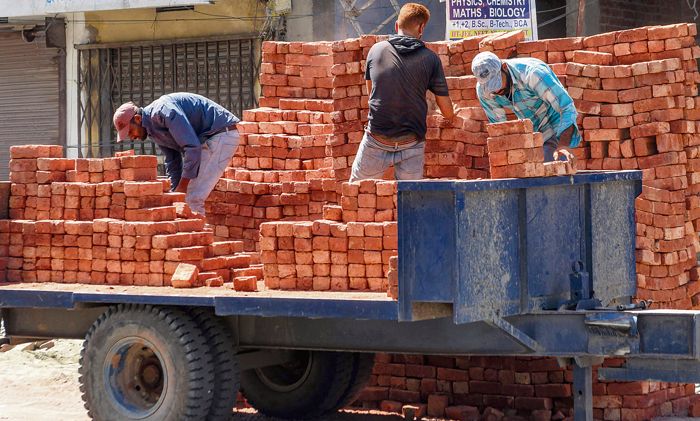
Utilise skills: The onus is now on the states to provide livelihoods to those who have fled the harshness of urban employers to seek refuge in their places of origin.
Sushma Ramachandran
Senior Financial Journalist
It is now time to think about the future of the migrant workers who have been journeying home ever since the lockdown began. Many have not been able to meet their families immediately owing to quarantine rules. And village leaders are apparently as rigid as urban RWAs about the need to keep the mahamaari or epidemic at bay in any way possible. Even after clearing this hurdle, the returnees face the bleak prospect of unemployment and yet more hardships. Some are prepared for jobs through the MGNREGA, but others are more skilled and used to higher wages in the urban areas.
The onus is now on the states to provide livelihoods to those who have fled the harshness of urban employers and landlords to seek refuge in their places of origin. The states must become proactive and innovative and productively utilise the skills of these millions of able-bodied workers.
Much has been talked about the plus points of India’s demographic dividend. It is now for the Centre and the states to walk the talk as far as the relatively youthful population of the migrant workers is concerned. The steps taken so far related to labour have been ill considered.
The most significant has been the move by many states to suspend labour laws virtually entirely or extend workers’ timing from eight to 12 hours. The uproar over depriving workers of their rights, fortunately, led to a partial rethink. UP and Rajasthan have rolled back the extension of working hours and others need to do the same. The fact is that these laws need to be reviewed carefully and only those which prove a hurdle to growth and productivity should be removed. The basic rights of workers must not be discarded in this cavalier manner.
As for the livelihood issue, one must take a close look at the critical states of UP and Bihar which account for the largest number of returnees. As many as 23 lakh migrants are estimated to have returned to UP, with probably an equal number to Bihar. Both the states have taken different policy trajectories to deal with the situation. UP has realised that this is a chance to carry out much-needed reforms and thereby lure investment and industries to the state.
But the move to free industry from complying with most labour laws is presuming that this has been the only hurdle to investors in the state. Revamping labour laws is no guarantee that either productivity will improve or more investments will flow into the state. On the plus side, UP Chief Minister Yogi Adityanath has been on an aggressive drive to woo investors who might conceivably shift base from China to India. Bihar, on the other hand, has been low key, with Chief Minister Nitish Kumar’s comments indicating concern over the prospect of dealing with lakhs of returning migrants, both in terms of health as well as job issues.
The problem is that it is not just complex archaic labour laws that have been holding back foreign investments from the Hindi heartland states like UP and Bihar. It has to be recalled that despite the northern region being the biggest car market in the country, only Maruti opted to invest in Haryana while there are none in the neighbouring states. Hyundai, Ford, Toyota and others have preferred to make investments in the southern states of Tamil Nadu and Karnataka. This, despite the fact that most of their cars have to be sent all the way to the northern region for sales. Similarly, only HCL opted to set up shop in Uttar Pradesh, while the rest of the software and computer industries settled for the southern states. The situation is even worse for Bihar, which has largely been shunned by the investors.
In other words, these states have to provide an enabling environment for the industry to flourish, which means providing basic infrastructure like assured power supply, roads and broadband services. And most of all, they have to cut red tape and corruption which are the biggest obstacle for investments in this country. Blaming labour policies for lack of investment is inexplicable, given that these are uniform all over the country.
So, the immediate prescription for these states to cater to the job needs of migrants is to collect a data base of workers’ skill sets. On this score, both claim that progress has been made already. In both states, surveys show the biggest chunk of workers is skilled in construction activities, followed by masons and carpenters.
The next step is to ensure that bureaucratic red tape is eliminated by providing a single-point clearance for projects. It is the gigantic dragon of red tape that is the most daunting prospect for potential investors in UP and Bihar. The second is the availability of land and ensuring ease of acquisition. The third is the availability of basic infrastructure and, lastly, there are issues linked to the multiplicity of complex labour laws which need to be resolved only after a careful study.
One of the positives for the returning migrant workers has been the media focus on their hardships and the continuing interest in their welfare. No wonder then that UP has now declared that it will be providing health insurance as well as other social security benefits to these workers. Bihar may also follow suit. In addition, the compulsions of social distancing may ensure that workers will have to be provided not just with housing close to their work sites but also adequate protective gear for operations.
In other words, there could be a better outcome for these workers as a result of the pandemic crisis that forced them to trek back to their home states.
Politics over migrant workers, however, needs to be avoided. The declaration by the UP Chief Minister about not allowing workers from the state to go to others without clearance is clearly an overreach. People cannot be denied the liberty to move from place to place within the country to better their economic prospects.
While it is heartening that a migrants commission is being set up by the state to focus on the welfare of workers, it cannot be used to prevent them from going elsewhere in pursuit of their self-interest. Free movement of people throughout the country is a norm that must not be curtailed at any cost. Instead of playing politics, the states would be well advised to focus on ensuring that the returning migrants are provided with food, shelter and jobs without any delay.
Join Whatsapp Channel of The Tribune for latest updates.




























